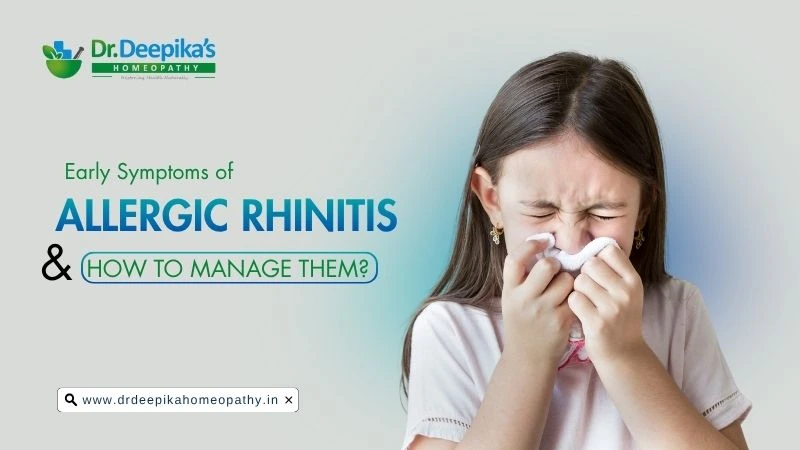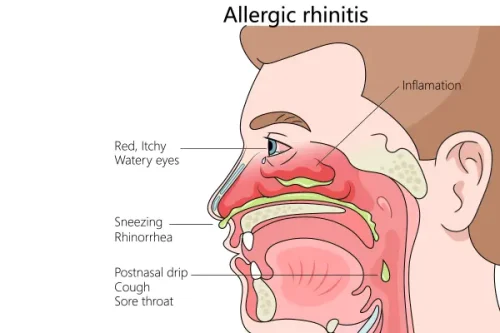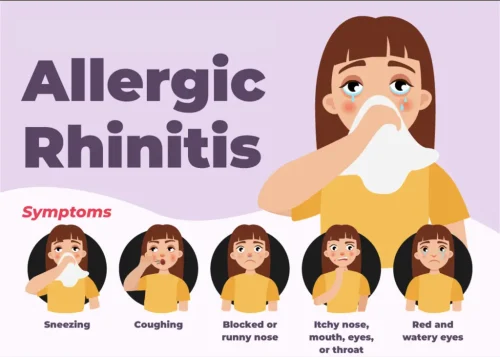
Early Symptoms of Allergic Rhinitis and How to Manage Them?
Allergic rhinitis (commonly referred to as hay fever) is a condition seen in many individuals around the world. Early symptoms can be easy to dismiss and assume they are just the common cold. However, if you identify the symptoms earlier and take measures sooner, you may feel better and more in control of the situation. In this blog, we will look at early symptoms of allergic rhinitis, the cause of symptoms, and how you can manage allergic rhinitis using easily integrated methods.
What is Allergic Rhinitis?
Allergic rhinitis, commonly known as hay fever, is an allergic response triggered by the immune system when it comes into contact with airborne allergens like pollen, dust mites, mold, or animal dander. When these allergens enter the nose, the immune system releases histamine, leading to inflammation and symptoms like sneezing, a runny or stuffy nose, an itchy nose, or itchy, watery eyes. Allergic rhinitis can be seasonal, caused by pollen, or perennial, caused by indoor allergens. Allergic rhinitis is not life-threatening, but it can affect sleep, concentration, and overall quality of life, so controlling symptoms as soon as possible is important.

Early Symptoms of Allergic Rhinitis
Early symptoms of allergic rhinitis appear after exposure to allergens like pollen, dust, or pet dander. They mimic a common cold but result from histamine release, causing nasal inflammation, sneezing, itching, and congestion. Early recognition helps prevent sinus issues and improve comfort.
- Frequent sneezing is one common early sign, which tends to occur in the morning or immediately after exposure to an allergen (e.g., pollen, dust).
- Itchy nose, throat, or roof of the mouth, producing discomfort and often leading to a common behavior called the “allergic salute” in which sufferers rub their nose repeatedly in response.
- Clear, runny, or watery nasal discharge, which is almost always persistent and does not involve thick-bodied nasal mucus, as seen in viral infections.
- Nasal congestion or a blocked nose, in which breathing can become difficult, resulting in mouth breathing or a lack of smell function.
- Watery, red, or itchy eyes, which i an event called allergic conjunctivitis and usually includes a clear, tear-like substance and sensitivity to bright lights.
- Post-nasal drip, in which mucus accumulates and trickles down the back of the throat, inducing chronic throat irritation, cough, or sore throat.
- Mild fatigue or tiredness, usually due to disrupted sleep due to nasal blockage or frequent sneezing, or simply due to not breathing properly while sleeping.
- Pain in the head or face, or pressure in the head or face, sometimes from congestion and inflammation from the sinuses, in more severe or serious cases.

How to Manage Allergic Rhinitis Symptoms?
Management generally consists of a combination of avoiding triggers, practicing simple self-care, and medications as needed. You can apply various identified principles to guide your plan.
1. Identify and Reduce Exposure to Triggers
Because allergic rhinitis occurs in association with exposure to allergens, reduction of exposure is key. Here are a few tips to consider:
- Keep your windows shut!
- When the wind is blowing and there is high pollen, avoid being outside.
- Use dust-mite science covers on pillows and mattresses.
- Vacuum, wash, and clean to reduce indoor allergens (e.g., dust, pet dander).
- Shower and change clothes after being outside in high pollen.
- Avoid physically demanding activities when pollen counts are at their highest, which is often early morning.
2. Nose/Sinus Hygiene
Simple hygiene of your nose and sinuses can make a significant difference. For instance, consider:
- Using a nasal rinse/spray with saline to rinse allergens and mucus out.
- Maintain moderate humidity in your environment (to decrease dust mite and mold exposure).
- Avoid frequent use of decongestant nasal spray (to avoid rebound congestion).
- Medications Available Without a Prescription.
You can usually treat mild symptoms with medicines available in pharmacies, including:
- Oral antihistamines to relieve sneezing, itching, and a runny nose.
- Decongestant sprays or drops (for short-term relief of a blocked nose and should not be used long-term.
- Medicines (known as nasal corticosteroid sprays or intranasal steroids) are recommended for moderate to persistent symptoms or present more than mildly.
When to Consult Your Health Care Provider
If your symptoms are moderate to severe that they interfere with your daily life (work, sleep, school).
- If you have asthma and your breathing is worsening.
- If over-the-counter medications are not effective.
- If you are unsure what is causing your symptoms.
Homeopathic Medicine for Allergic Rhinitis
Homeopathy offers gentle and effective remedies for allergic rhinitis by addressing its root cause and improving the body’s immune response. Homeopathic Medicine for Allergic Rhinitis helps relieve sneezing, nasal congestion, watery eyes, and itching without side effects. The choice of medicine depends on the individual’s symptoms and triggers.
- Allium Cepa: Effective for watery nasal discharge, continuous sneezing, and burning or itching in the eyes and nose. Symptoms often worsen in warm rooms but improve in open air.
- Arsenicum Album: Helpful for nasal blockage with burning, watery discharge, and restlessness. It works well when symptoms worsen at night or in cold environments.
- Sabadilla: Best suited for frequent sneezing, tickling, and intense nasal itching, especially triggered by strong smells or pollen exposure.
- Natrum Mur: Useful when allergic symptoms are triggered by exposure to sunlight, strong emotions, or sea air, accompanied by a runny nose and watery eyes.
- Nux Vomica: Ideal for nasal stuffiness, especially at night or in the morning. It benefits those sensitive to cold air or with symptoms worsened by overeating or stress.
- Pulsatilla: Suitable for thick yellow or greenish nasal discharge and symptoms that change with the weather. It is especially beneficial for people who feel better in cool, fresh air.

Disclaimer
The information provided is for educational purposes only and not meant to be a substitute for professional medical advice, diagnosis, or treatment. Always seek the advice of a qualified homeopathy doctor or other healthcare professional before starting any new medicine or treatment for eczema or other health conditions.
Conclusion
Homeopathy provides a gentle and holistic approach to treating allergic rhinitis by addressing its root cause rather than just suppressing symptoms. It helps reduce sneezing, nasal congestion, itching, and watery eyes while strengthening the body’s immune response. With guidance from an experienced homeopathy doctor, individualized remedies can offer long-lasting relief and prevent recurring allergic episodes. Early consultation ensures better management, improved breathing comfort, and a healthier, allergy-free life naturally.